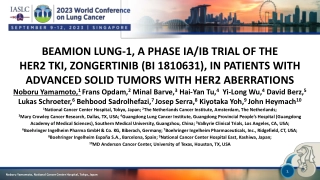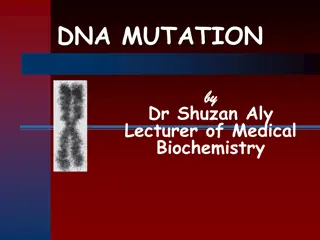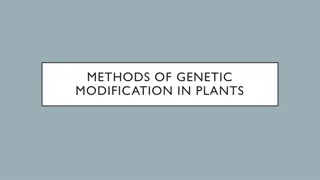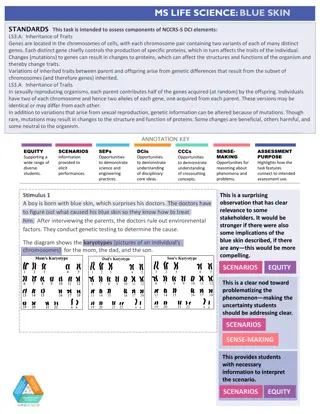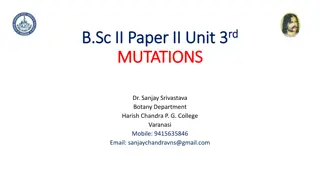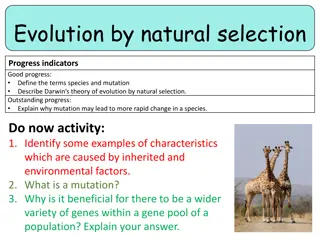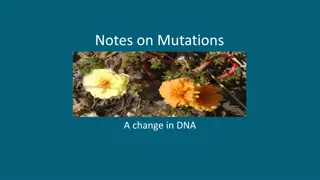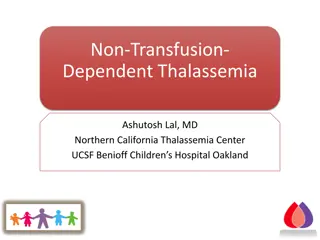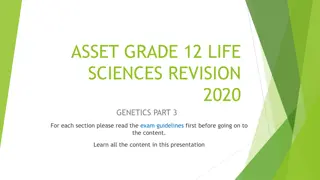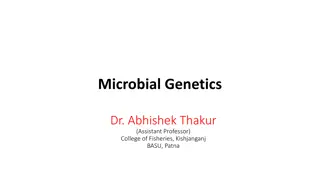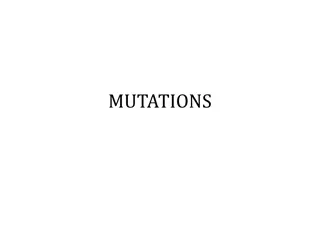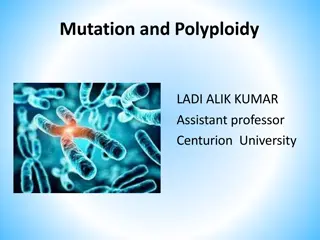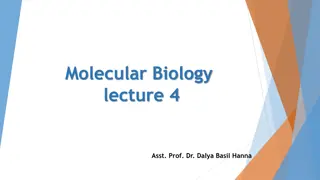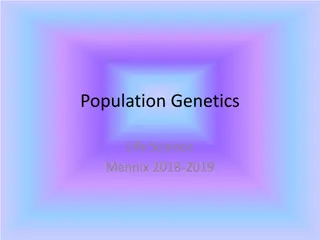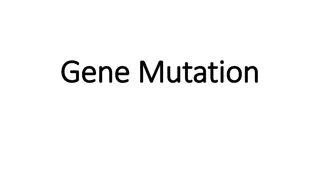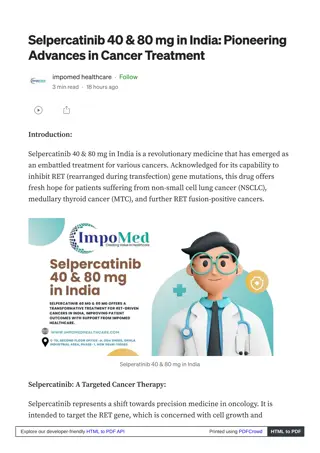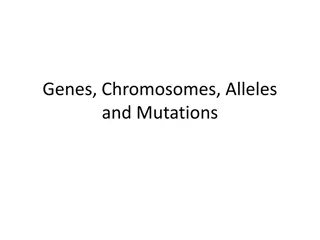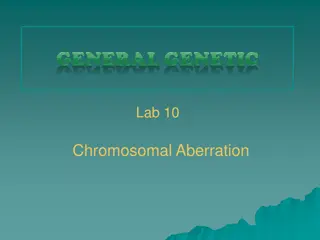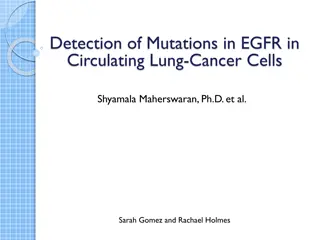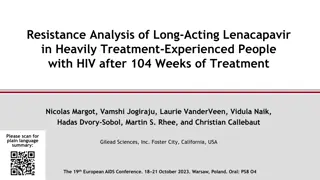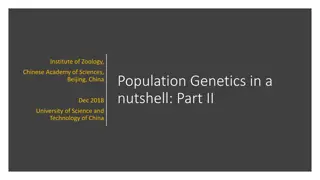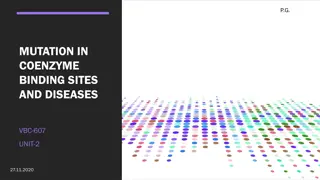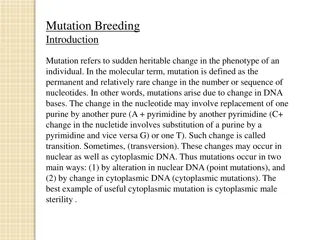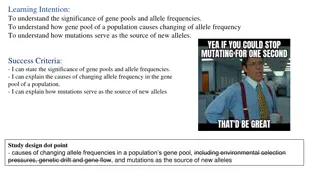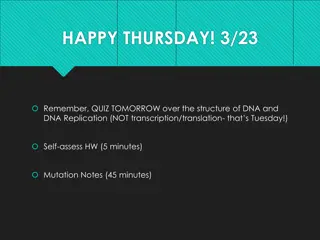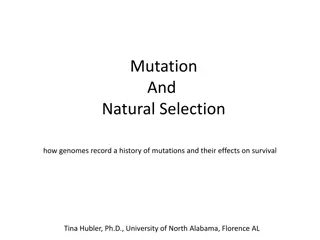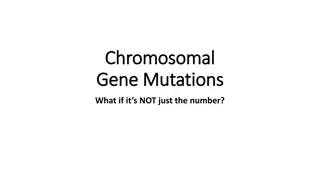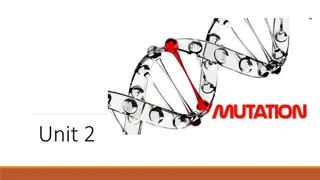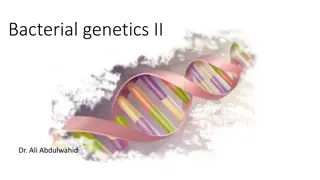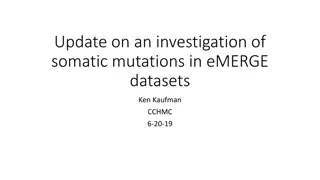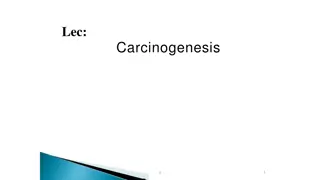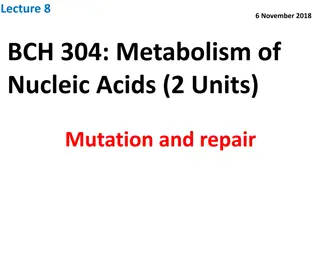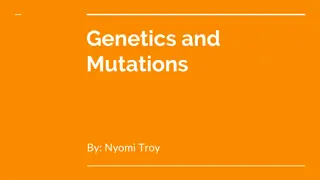Zongertinib Trial in HER2 Aberrant Tumors
Zongertinib (BI.1810631) Phase I Study in Advanced Solid Tumors with HER2 Aberrations focusing on NSCLC. The trial involves dose escalation and expansion, testing different doses in cohorts with varied HER2 mutations. Primary endpoints include MTD, OR, and DLTs.
2 views • 14 slides
Improving HER2 Targeting in NSCLC With Selective TKI
HER2 activation plays a crucial role in promoting tumor proliferation and survival in NSCLC. Driven by oncogenic downstream signaling pathways, HER2 overexpression and gene amplification lead to the formation of heterodimers and activation of key signaling cascades. Additionally, HER2 mutations are
0 views • 36 slides
Understanding DNA Mutations and Their Types
DNA mutations are changes in the DNA molecule that can lead to permanent alterations in the base sequence of daughter DNA. Causes include uncorrected errors, as well as damage from oxidative deamination, radiation, and chemicals. The types of mutations include point mutations, insertion mutations, d
4 views • 7 slides
Different Methods of Genetic Modification in Plants
Genetic modification in plants can occur through natural selection, selective breeding, and induced mutations. Natural selection involves breeding compatible species to create offspring with desired traits, while selective breeding is a multi-generational process to breed organisms with specific cha
1 views • 11 slides
Understanding Inheritance of Traits Through Blue Skin Case Study
Assessing genetic inheritance and mutations using a case study of a boy with blue skin. The scenario highlights how genes control traits, the random assortment of chromosomes in offspring, and the impact of mutations on protein function. Students analyze karyotypes to infer genetic differences betwe
0 views • 6 slides
Understanding Mutations: Types, Characteristics, and Examples
Mutations are changes in the genetic material that can affect an organism's traits. This article explores gene mutations, their historical background, characteristics, kinds of mutations like spontaneous and induced, somatic and germinal mutations, and conditional lethal mutations. It also covers ge
2 views • 18 slides
Understanding Evolution by Natural Selection
Explore the concepts of species, mutation, Darwin's theory of evolution, and the role of genetic variation through mutations. Learn how mutations can lead to rapid changes in species and why a wider variety of genes in a gene pool benefits a population. Delve into the effects of mutations on individ
0 views • 15 slides
Understanding Mutations in DNA and Their Effects
Mutations in DNA are changes that can occur in body cells or gametes, leading to alterations in the genetic code. Not all mutations are harmful, but they can impact protein structure and function. Different types of mutations, such as substitutions, insertions, and deletions, can result from various
0 views • 11 slides
Understanding Non-Transfusion-Dependent Thalassemia
Delve into the complexities of Non-Transfusion-Dependent Thalassemia as explained by Dr. Ashutosh Lal, MD, from the Northern California Thalassemia Center at UCSF Benioff Children's Hospital Oakland. Explore the various Thalassemia syndromes, patient profiles, causes, and transfusion requirements as
1 views • 25 slides
Pediatric Patient with DIPG/DMG and Genetic Mutations
This case study presents a 0.5-year-old patient diagnosed with Diffuse Intrinsic Pontine Glioma (DIPG) and Diffuse Midline Glioma (DMG) with genetic mutations in H3F3A and TP53. The patient has not undergone prior treatment and is at WHO grade IV stage. Images of tissue samples and stains are provid
1 views • 4 slides
Understanding Genetics: Mutations, Chromosomal Aberrations, and Genetic Engineering
Genetic mutations can be harmless, harmful, or beneficial, leading to variations within a species. Examples of gene mutations and chromosomal aberrations, like Trisomy 21, illustrate genetic abnormalities. The increase in Down Syndrome cases with maternal age highlights a maternal age effect. Geneti
0 views • 17 slides
Understanding Microbial Genetics and Mutations in Organisms
Explore the world of microbial genetics with Dr. Abhishek Thakur, an Assistant Professor specializing in Microbial Genetics at the College of Fisheries, Kishjanganj, BASU, Patna. Learn about important concepts such as strains, clones, genome, phenotype, genotype, genes, genetic recombination, and mu
0 views • 19 slides
Understanding Mutations in Biology
A mutation in biology refers to changes in the nucleotide sequence of an organism's genome. These alterations can either be harmful, leading to conditions like cancer, or beneficial, such as providing antibiotic resistance. Mutations can occur in somatic cells or gametes, affecting both the individu
1 views • 18 slides
Understanding Mutation and Polyploidy in Genetics
Mutation is a sudden hereditary change in an organism's genetic makeup, leading to variations in offspring. This article delves into the history, types, and causes of mutations, featuring significant discoveries by scientists like De Vries and Morgan. It also explores the concept of spontaneous muta
0 views • 50 slides
Understanding Gene Mutations in Molecular Biology
Gene mutations play a significant role in molecular biology, leading to alterations in DNA sequences that can impact offspring. These mutations can arise spontaneously or be induced by various factors, such as mutagens. Understanding gene mutations is crucial for comprehending the genetic basis of c
2 views • 27 slides
Understanding Population Genetics and Allele Frequency Changes
Population genetics explores how allele frequencies change within populations due to factors like mutations, migration, genetic drift, nonrandom mating, and natural selection. Mutations introduce new variations, migration affects gene flow, genetic drift causes random allele loss, and examples like
1 views • 18 slides
Understanding Gene Mutations and Their Impact on DNA Sequences
Gene mutations are changes in the nucleotide sequence of DNA, leading to potential amino acid alterations in proteins. These mutations can occur due to replication errors or external factors like chemicals and radiation. Different types of mutations, such as base substitutions, transitions, transver
0 views • 11 slides
Breakthrough Cancer Therapy in India: Selpercatinib 40 80 mg for RET Mutations
Selpercatinib 40 & 80 mg is an innovative targeted therapy designed to inhibit RET gene mutations, providing a highly precise treatment option for patients with non-small cell lung cancer (NSCLC), medullary thyroid cancer (MTC), and RET fusion-positive thyroid cancers. Now available as Selpercatinib
0 views • 11 slides
Understanding Genes, Chromosomes, Alleles, and Mutations in DNA
Explore the intricate world of genetics through genes, chromosomes, alleles, and mutations. Delve into the fundamental structures of DNA, such as nucleosomes and eukaryotic chromosomes. Gain insights into key genetic terms like genes, alleles, and genome composition. Learn about mutations, including
0 views • 11 slides
Understanding Chromosomal Aberrations and Mutations in Genetics
Chromosomal aberrations and mutations are key events that can alter the genetic structure of organisms. They can lead to numerical abnormalities like aneuploidy and structural abnormalities such as ring chromosomes and chromosome fragments. Understanding these variations in chromosomes is crucial in
0 views • 10 slides
Understanding Mutations: Types and Effects
Explore the world of mutations in this informative content covering topics such as how superheroes like Cyclops, Hulk, and Spiderman acquired their powers, the different types of mutations including small-scale mutations like substitution, deletion, and insertion, as well as large-scale mutations af
0 views • 23 slides
Understanding Transition Bias and Substitution Models in Genetics
Transition bias and substitution models, explored by Xuhua Xia, delve into the concepts of transitions and transversions in genetic mutations, the causes of transition bias, the ubiquitous nature of transition bias in invertebrate and vertebrate genes, the mitochondrial genetic code, and RNA seconda
1 views • 25 slides
Understanding Natural Selection in Higher Biology
Natural selection in action is demonstrated through mutations that impact an organism's adaptation to changing environments. Sickle cell anemia, a genetically transmitted blood disorder, exemplifies the consequences of specific mutations. The condition manifests in various symptoms, affecting indivi
0 views • 18 slides
Detection of Mutations in EGFR in Circulating Lung Cancer Cells: Study on SARMS Assay and CTC-Chip
This study by Shyamala Maherswaran, Ph.D., and team focuses on characterizing mutations in EGFR in circulating tumor cells using SARMS assay and CTC-chip. The research investigates the effectiveness of these non-invasive methods in analyzing tumors and explores the role of the T790M mutation in resp
0 views • 12 slides
Resistance Analysis of Long-Acting Lenacapavir in HIV Treatment: 104-Week Findings
Study on long-acting lenacapavir in heavily treatment-experienced HIV individuals after 104 weeks revealed emergence of lenacapavir resistance-associated mutations. Lenacapavir, a potent HIV-1 capsid inhibitor, has shown activity against ARV-resistant strains. The CAPELLA study analyzed lenacapavir
0 views • 11 slides
Understanding Mutations: Types, Causes, and Significance
Explore the world of gene mutations and chromosome mutations, including point mutations, frameshift mutations, and changes in chromosome structure. Learn about the significance of mutations, how they can be inherited or acquired, and their impact on genetic information. Uncover examples of neutral,
0 views • 9 slides
Understanding Population Genetics: Mutations, Variability, and Evolution
Explore the fascinating world of population genetics, covering key concepts like the history of population genetics, mutation types, measurement of variability, and mutation rates. Delve into the diverse mutations such as substitutions, insertions, deletions, and duplications, along with how these v
0 views • 47 slides
Mutations in Coenzyme Binding Sites and Related Diseases
Mutations in coenzyme binding sites can lead to diseases by impacting enzyme affinity and reaction rates. Defects in proteins like ornithine aminotransferase and cystathionine-synthase result in conditions such as gyrate atrophy of the choroid and retina, homocystinuria, and X-linked sideroblastic a
0 views • 14 slides
Understanding Mutation Breeding in Crop Plants
Mutation breeding involves inducing heritable changes in crop plants through mutations, leading to genetic improvements for economic traits. This method is valuable when desired variability is lacking, for correcting genetic defects, overcoming linkage issues between desirable and undesirable traits
0 views • 22 slides
Understanding Gene Pools, Allele Frequencies, and Mutations in Population Genetics
Dive into the significance of gene pools and allele frequencies, exploring how mutations drive the emergence of new alleles. Learn about factors impacting allele frequencies like mutations, environmental pressures, genetic drift, and gene flow. Discover the types of mutations and their effects on po
0 views • 13 slides
Understanding Mutations and Their Effects on DNA
Learn about the structure of DNA, DNA replication, and various types of mutations such as substitution, deletion, and insertion. Explore how mutations occur, their effects at the molecular level, and how environmental factors can influence them. Discover the impact of mutations through examples of s
0 views • 17 slides
Understanding Mutations and Natural Selection in Genomes
Explore how mutations impact survival and how genomes record these changes, distinguishing between functional and nonfunctional sequences. Learn about the effects of mutations on organism survival and the role of natural selection in shaping genetic variability.
0 views • 11 slides
Understanding Mutations in Biology: Clicker Questions Explained
Explore a series of clicker questions related to mutations in biology, covering topics such as the definition of mutations, their effects, inheritance patterns, and the impact on amino acid sequences. Gain insights into how mutations occur, their consequences, and their role in genetic processes.
0 views • 18 slides
Understanding Chromosomal and Gene Mutations in Genetics
Chromosomal and gene mutations play a crucial role in genetic variations. Mutations such as insertion, deletion, and substitution can lead to significant changes in DNA sequences, affecting gene expression and cellular functions. Additionally, chromosomal mutations like deletion, amplification, inve
0 views • 15 slides
Understanding Genetic Mutation and Its Impact on Evolution
Genetic mutations are a natural process that introduces variations in DNA sequences, creating new alleles and genetic diversity within populations. These mutations can have both positive and negative effects on individuals, influencing survival and reproduction. By examining different types of mutat
0 views • 28 slides
Understanding Bacterial Genetics: Phenotypic and Genotypic Variability
Phenotypic and genotypic variations in bacteria are crucial for their adaptation and survival. Phenotype reflects the physical expression influenced by both the genome and the environment, while genotype represents the hereditary constitution passed to offspring. Mutations are a primary source of ge
0 views • 23 slides
Comprehensive Analysis of Somatic Mutations in eMERGE Datasets
This investigation delves into somatic mutations across normal tissues, revealing macroscopic clonal expansions. The study processed a large number of samples and identified candidate mutations, with characteristics and functional predictions detailed. Genes with the most somatic mutations are highl
0 views • 24 slides
Understanding the Fundamentals of Carcinogenesis and Cancer Hallmarks
Carcinogenesis involves non-lethal genetic damage, clonal expansion of precursor cells, and multi-step processes, with the involvement of normal regulatory genes. The hallmarks of cancer include self-sufficiency in growth signals, insensitivity to inhibitory signals, evasion of cell death, replicati
0 views • 16 slides
Understanding Causes of Mutations and Repair Mechanisms
Mutations can be classified into spontaneous and induced mutations based on their origin. Spontaneous mutations occur naturally, while induced mutations are caused by mutagens. Understanding the causes of mutations and repair mechanisms is vital in studying genetic variation and disease development.
0 views • 13 slides
Understanding Genetics and Mutations
DNA, the building block of life, contains the genetic code of organisms and is made up of nucleotides. Adenine pairs with thymine and cytosine pairs with guanine in a double helix structure, held together by hydrogen bonds. DNA replication creates identical DNA copies, while transcription produces R
0 views • 18 slides
